Find free Wisconsin divorce records, accessible online in most cases and within citizens’ reach once they know which agencies host and distribute this information.
These records include the ex-couples’ names, date of divorce, and — depending on the situation — they may include other details such as the division of assets and domestic abuse.
Through this resource, citizens are empowered with the tools and know-how to determine if someone is divorced through official databases hosted by the state, county and cities within Wisconsin.
Can Anyone View Divorce Records in the State of Wisconsin?
Divorce records are an essential part of court proceedings. To access divorce records in Wisconsin, individuals must know the law.
Wisconsin’s Open Records Law demands that most court records, including those of divorces, be made public.1 This means anyone can access these documents. Yet, certain details could be hidden or excluded for different reasons, for instance:
- You won’t find children’s names listed publicly due to privacy and safety concerns.
- Similarly, victims of domestic violence have their identities protected.
- Business-related data shared during a divorce proceeding may remain private.
Sometimes, though, people prefer sealing all data related to their case from the public view. To do so you would need a convincing argument in court about potential harm if the information is disclosed freely.
To get these sealed records, you will require extra steps – either a legal order or subpoena must be acquired, as these aren’t readily available online. This could be made via mail-in requests or by visiting the courthouse where everything was finalized.
Wisconsin’s 2021 divorce rates stand as low as 2.1 per 1k individuals, reflecting a steady decline since the ’90s era.2 Since Wisconsin divorce papers are considered court records, interested parties can also use third-party providers offering such services for searching them.
How To Find Wisconsin Divorce Records
Anyone seeking divorce records in Wisconsin has several options to go about it, depending on what they need – certified copies or uncertified ones, with the latter option being accessible online.
Requesters can access the divorce records through the Wisconsin Court System website. Firstly, they have to visit the case search portal provided by the Wisconsin government – a free public divorce records search option.3
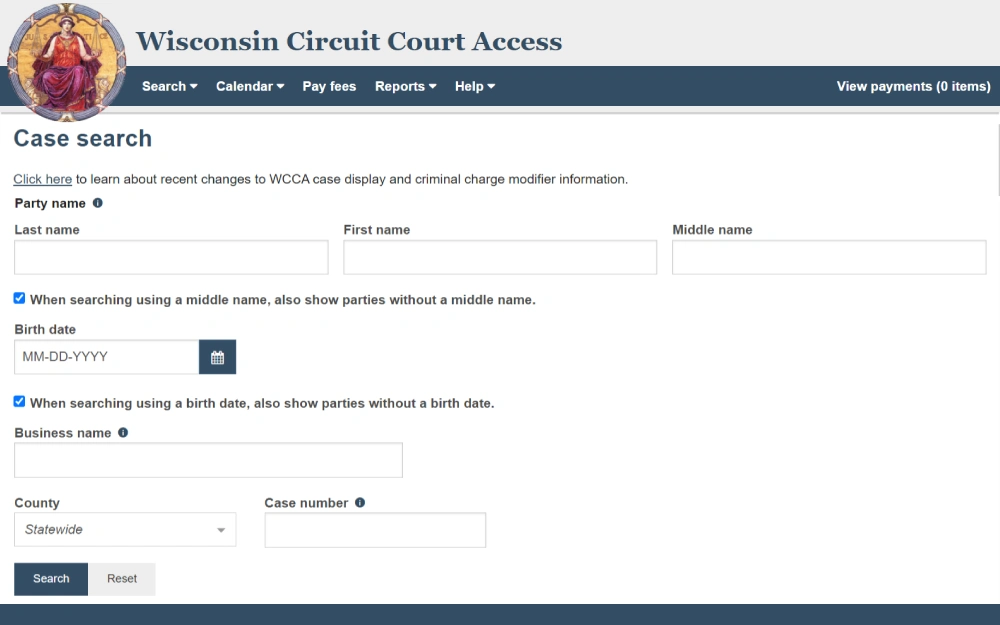
Then they have to enter the name of one of the parties involved in the divorce, including some other details, such as their birth date, case number and the name of the county where the separation took place. The search portal will then provide you with the uncertified copy of the said record.
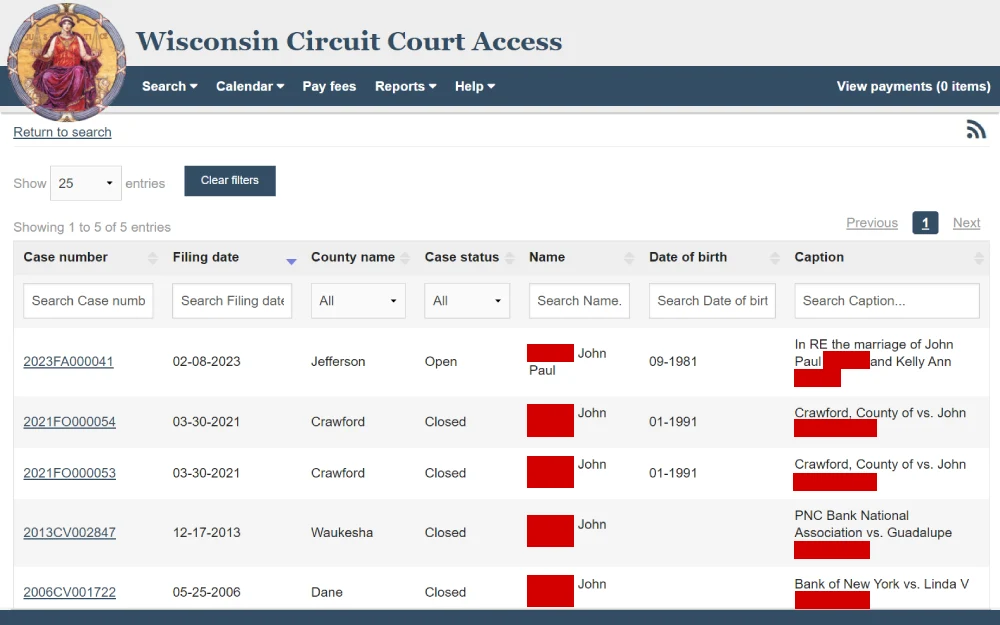
The Office of Vital Records in Wisconsin also holds divorce records from as far back as 1907. These valuable papers come under the jurisdiction of the Division of Public Health (DPH). The Register of Deeds Offices in respective counties also maintains these documents.
Inquirers who want these records from DPH. must file their request either personally or by mail. For Mail Orders, you will need to fill out a Wisconsin Divorce Certificate Application and then mail it to the following address:4
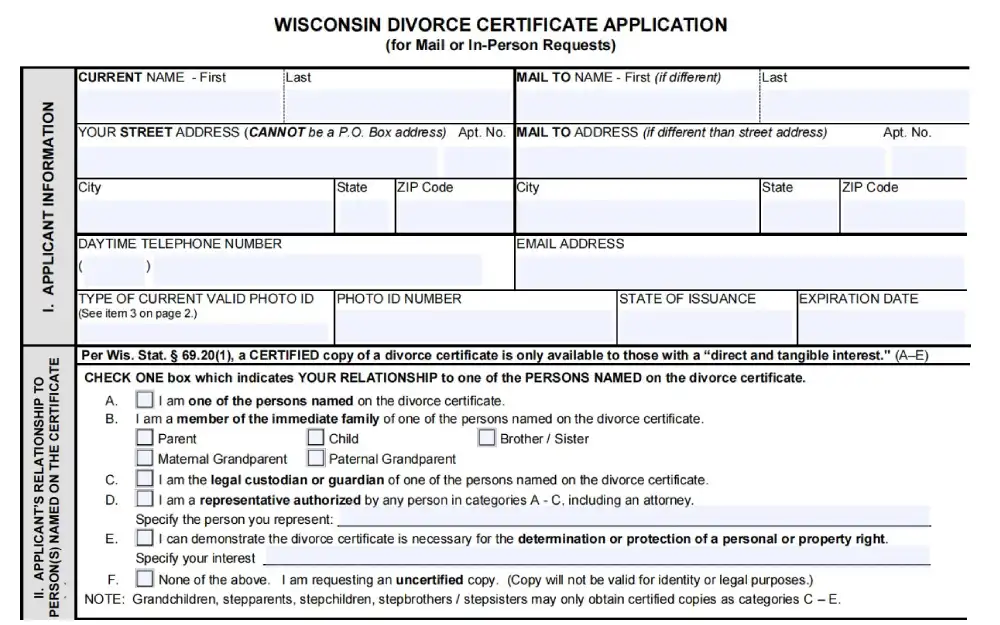
Wisconsin Vital Records Office
P.O. Box 309
Madison, Wisconsin 53701
Usually, the DPH finishes processing requests within ten business days after receiving them, but expect some delay due to mailing time.
Obtaining such records isn’t free though; charges apply albeit minimal ones—a $20 fee for the first copy and $3 for any extra copies per record. Payments should be through cash, check, or money orders made out in U.S. dollars and payable via a U.S-based bank addressed to ‘State of Wis Vital Records’.
Interested citizens could also visit the Office of Vital Records, Wisconsin. They work on weekdays from 9 a.m. to 3:30 p.m. as per Central Standard Time (C.S.T.). The procedure for acquiring the record dictates that you fill out the above stated form and pay the costs associated with accessing them (which are also the same).
What you cannot forget is your I.D. Your ID could be a state-issued driver’s license or identification card, U.S. government issued photo I.D. or a foreign passport or your military identification card.
Once all is set with this process, getting access to essential records takes barely an hour. You could visit the office at the following address:
Wisconsin Vital Records Office
1 West Wilson Street, Room 160
Madison, Wisconsin 53703
If you want to access the records online or over the phone, then the Wisconsin Vital Records Office outsources them to VitalChek.5 To place an order, you can access their website or call them at 877-885-2981 to order by phone.
Searching County Agencies in Wisconsin for Divorce Records
The Vital Records Office provides the broadest search results for divorce records and to narrow down the search, citizens can directly contact the Register of Deeds office of their respective counties.
However, this particular office only holds divorce certificates that were issued after January 1, 2016. If you want to acquire divorce records predating the said date, then you must contact the Court Clerk of their respective county.
Milwaukee County: Persons seeking divorce records or other vital records in Milwaukee County, Wisconsin that predate January 1, 2016, should approach the Clerk of the Milwaukee Circuit Court.6 Curious parties are required to fill out the Records Request Form.7
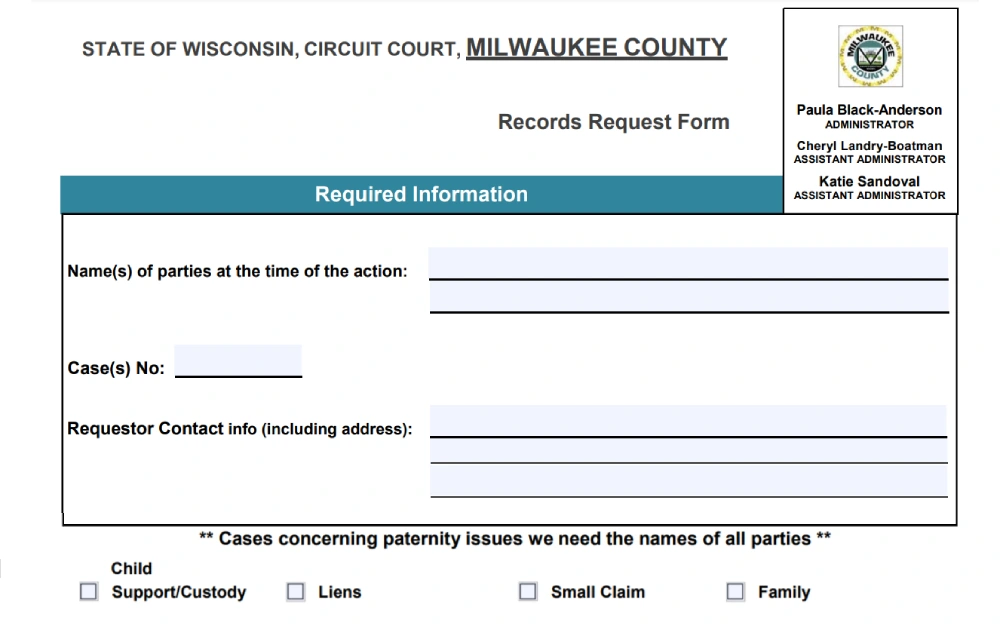
They could also visit the office at the following address:
Milwaukee Circuit Court Clerk
Courthouse 901, North 9th Street
Milwaukee, WI 53233
Prospective requesters can get quick answers by calling 414-278-4135 or emailing their inquiries at [email protected].
Since January 1, 2016, however, individuals can also obtain Wisconsin divorce records from the Milwaukee County Register of Deeds office, which is responsible for maintaining and providing them.8
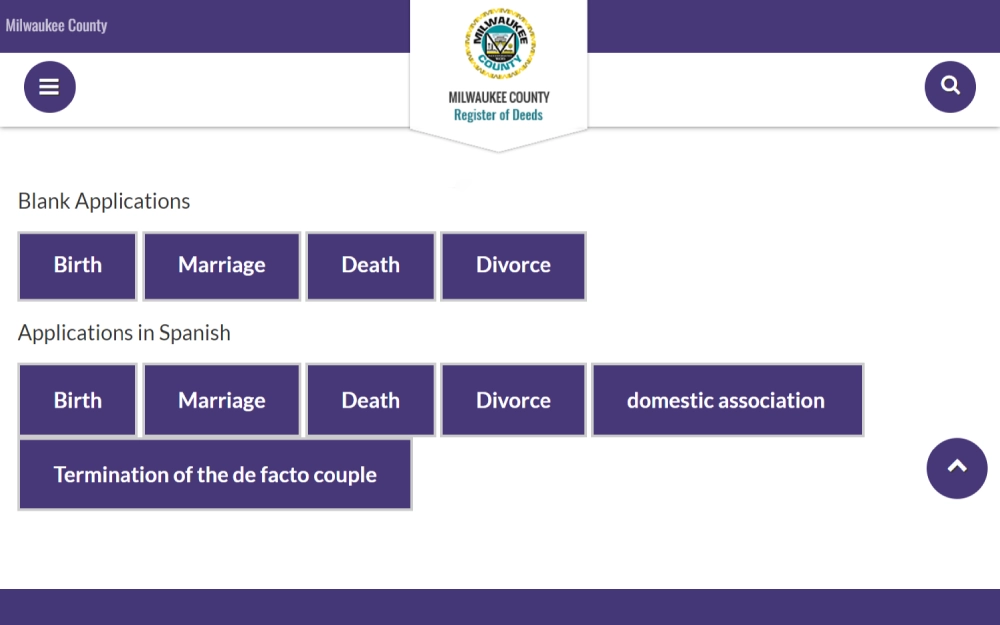
Citizens may make these requests through postal mail or personal visits to the office below:
Milwaukee County Register of Deeds
901 N. 9th Street, Room 103
Milwaukee, WI 53233
Phone: 414-278-4021
Hours: 8 a.m. – 4 p.m. Monday through Friday
All requests necessitate filling up a specific form labeled ‘Divorce Records Request Form.’ Alongside this completed document there are two essential requirements: valid identification and payment via check or money order covering required fees.
Besides that stipulated $20 charge for each certified copy of the divorce record, expect an extra $3 cost per duplicate, for applicants seeking additional copies. Relatives requesting vital documents on behalf of others will also have to complete another form titled Vital Records Consent Form.9 All these procedures help ensure data safety and user convenience while retrieving important marital documents in Milwaukee County.
Dane County: For those living in Dane County, the Register of Deeds Office has a special Vital Records Section. They keep important documents like birth certificates, death reports and, yes — divorce records, too.
Getting hold of these records requires some steps. You begin by filling out the same divorce record request form provided by the Vital Records Office. The fee associated with this request is the same as mentioned above.
To pay for it, cash or money order always works, and so do business checks or credit cards. Keep in mind though, if you use a debit or credit card, there may be an extra charge starting from $2.50.
Any records that are registered before January 1, 2016, can be found by contacting the Clerk of Courts Record Centre at the following address:
Dane County Courthouse
215 South Hamilton Street, Room 1000
Madison, Wisconsin 53703
Phone: 608-266-4311
You could place your request via email at [email protected], with every copy costing $1.25 per page.
Waukesha County: To get Waukesha County divorce records, you will first need to make an appointment with their Register of Deeds Office, which could be made by calling 262-548-7863.10 After scheduling the appointment, you can visit their office from 9:00 a.m. to 3:30 p.m. on weekdays. The physical address for in-person visits is as follows:
Waukesha County Register of Deeds
515 West Moreland Boulevard, RM AC110
Waukesha, Wisconsin 53188
Those who prefer digital methods can opt to request the information via email. Interested individuals must fill out an application form for divorce record request and send it to [email protected]. They also have to email their identification document; a photocopy of your state I.D. or even a passport photo would suffice.
Payment could be made through a money order or a check made payable to the Register of Deeds. Inquirers could also use their credit or debit cards for the same purpose, but that would require filling out a credit/debit authorization release form.11
For postal mail requests, a complete application (form, I.D. and payment proof) bundled with a self-addressed stamped envelope should be sent to the address listed above.
It is important to note that the fees associated with acquiring the records are the same as set by the Wisconsin Vital Records Office, i.e., $20 for the record and $3 for every additional copy. If the records you wish to obtain date before January 1, 2016, then you will need to contact the Clerk of County Court via Phone at 262-548-7544 and request the said documents.
Divorce records in Wisconsin are maintained at either the state level or the county level. They are not maintained at the city or town level, thus individuals should consult either the Vital Records Office or the Register of Deeds Office of their respective counties to look for divorce records.
As for requesters who are seeking out these divorce records for mapping out family histories or genealogical purposes, they can also look into records available at state and national archives, or private bodies that retain such documentation.
Utilizing Wisconsin Record Archives To Uncover Divorce Information for Genealogy Purposes
Wisconsin divorce records from the past aren’t just legal documents; they are pieces of history that tell fascinating stories about people’s ancestors and you might be curious about how to find these pieces from your and your family’s past.
The State Historical Society of Wisconsin, both a state agency and a private member organization, is responsible for maintaining historic court records. This also includes the divorce index of the state. It’s housed in Madison at the University of Wisconsin campus. This society diligently maintains books and papers about Wisconsin’s history, holding around four million items on North American history.
Excitingly, this collection also includes older local government records as well as court system files. At their defined life end point, circuit and appellate court documents become part of this society’s valuable archives.
If you want to explore the library’s resources, then you can use their catalog to find specific information.12
Rather than searching by party names directly, it would be more effective to look under ‘Author.’ There you could input county-specific details like ‘Wisconsin Circuit Court Dane County’ or any other county to look for specific divorce records.
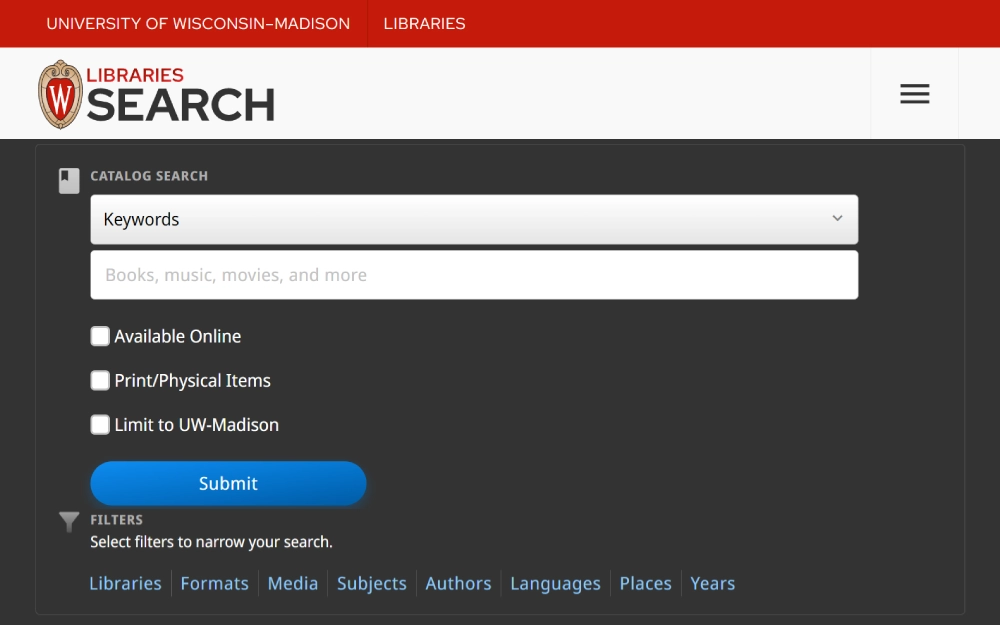
You could also start by visiting the National Archives or the Federal Record Center.13 Here you will find detailed court records from Wisconsin over the years. University of Wisconsin Green Bay also offers another good resource for tracking down family data, and they do offer guidance on searching the records.14
But don’t stop there; stories about your lineage may not only lie in formal channels but also could be found among tales told by the elder members of your family or even hidden away in church entries, old photographs or newspapers.
How To Look Up Wisconsin Dissolution of Marriage Records
In the state of Wisconsin, common law marriages or matrimony present an interesting scenario. In 1917, Wisconsin decided to stop recognizing common law marriages. Today’s system still upholds this mandate.
Even though they don’t have the same rights as traditionally married couples, partners in a common-law marriage are not prosecuted. It gets more complex when someone searches for a common law divorce record. Since these marriages aren’t technically acknowledged by the state of Wisconsin, there are no divorce records available with the official agencies in such cases.
So, if you’re searching for divorce documents related to a common-law marriage within Wisconsin lines, you will not be able to find one. Therefore, before someone enters into a Common-Law Marriage in Wisconsin, it is important that both parties understand what it entails legally, especially when dissolving such unions.
However, relationships like civil unions and domestic partnerships are recognized. If you’re in a partnership, whether it has official documentation or not, the law treats your situation much like a marriage. That means for couples of all kinds — opposite-sex or same-sex — there are regulations under Wisconsin Statute 770.05.15
Ending this formal arrangement involves paperwork, too. This process calls for the completion of a termination form, which the enlisted partner(s) need to file with the county’s Register of Deeds Office, where their initial declaration was recorded.
On record-keeping service, the office keeps track of these terminations, along with vital records at the state level, which they notify accordingly.
To find these records, individuals can contact either their Register of Deeds Office or Wisconsin’s Vital Records Office and follow the same procedure as discussed in previous sections.
How To Apply for a Divorce & Respond to Divorce Papers
In Wisconsin, a couple can part ways if they feel their marriage or nuptial is irreparable; because of this, the state falls under the category of a no-fault state.
The state doesn’t ask who did what wrong or if there was any ground for divorce. It’s all about both parties agreeing that there’s no fixing the relationship.
When filing a divorce in Wisconsin, there are certain steps that need to be taken. You must have lived in Wisconsin for no less than 6 months. Plus, at least one month should be spent in the county where you plan to file for divorce.
Firstly, a petition for divorce is filed either with your spouse or solely by you. If you are filing, your spouse needs to be served the divorce notice and proof submitted to the court. These include the following:
- The Joint Petition form FA – 4110V or both FA – 4111V and GF – 179;
- The Summons and Petition forms FA – 4104V OR FA – 4105V; and
- The Order to Show Cause and Affidavit for Temporary Order.
Then comes a wait-period of 120 days before any final hearing can happen.
Before this hearing, though, temporary orders regarding child support and custody, financial support, and property division might come into effect if required.
If children are involved, deciding who gets custody and where they live can be tough to decide. Here’s what courts usually base their decision on: The court tries to devise an agreement plan that favors the child’s best interests, with a placement plan allowing them to maintain their bonds with both parents.
When it comes down to property sharing, Wisconsin has community property rules in place. This implies each party gets half of the property, splitting assets from houses and cars right down to retirement accounts equally between spouses – even money trouble or debts built up over the course of marriage get shared, too.
Thereafter follows an agreement phase between parties on these issues before officializing the divorce terms. Matters are complicated when agreements cannot be found triggering mediation or arbitration ordered by the court. Even then, if a resolution remains unachieved, matters proceed under legal process, with the courtroom addressing all contentious points.
Costs are dependent and variable according to the conditions made in a divorce decree of the party involved along with their county location, but generally, filing incurs more than a $150 fee alongside additional charges pertaining to necessary forms and the attorney’s fee.
In Wisconsin, submissions for divorces can also be done online through the eFiling procedure.16 This can be found below the ‘eFiling tab’ option on the state Courts System website.
Annulment is another type of separation a couple can opt for instead of a divorce. It’s pretty much like standard divorces where couples split legally and go back to their pre-marriage status financially and physically. Even the child custody division becomes part of it if kids are involved.
If you are applying for annulment, you will need to ensure that you’ve been living in Wisconsin for not less than 30 days before your filing date. You make a formal request by filling out the Petition for Annulment at any local circuit court near you or your spouse’s residence. The final verdict comes after a hearing at the circuit court, which involves witnesses and relevant evidence to support your case.
Moreover, there is also alimony, which is often referred to as spousal support or maintenance in many circles. This provision aims at sustaining each partner’s lifestyle even after divorce until they achieve self-sufficiency financially.
In making a decision on alimony, courts closely examine various angles, including but not limited to marriage duration, before making their final decision.
The steps to finding Wisconsin divorce records are discussed above at length; ensure to review them for convenient and seamless access to these vital documents.
For additional documents and record types, you can refer to either the Wisconsin marriage lookup resource to see who’s been married within the state, or the WI free public record search tutorial for clear guidance on tracking down details of property ownership, background check reports, births, deaths, criminal history, and much more.
References
1Wisconsin State Legislature. (2023, October 4). Chapter 19: General Duties of Public Officials. Retrieved November 13, 2023, from <https://docs.legis.wisconsin.gov/statutes/statutes/19.pdf>
2Centers for Disease Control and Prevention. (n.d). Divorce Rates by State: 1990, 1995, and 1999-2021. Retrieved November 13, 2023, from <https://www.cdc.gov/nchs/data/dvs/marriage-divorce/state-divorce-rates-90-95-99-21.pdf>
3Wisconsin Circuit Court Access. (n.d). Case Search. Retrieved November 13, 2023, from <https://wcca.wicourts.gov/case.html>
4Wisconsin Department of Health Services. (2016, November). Wisconsin Divorce Certificate Application. Retrieved November 13, 2023, from <https://www.dhs.wisconsin.gov/forms/f0/f05282.pdf>
5Wisconsin Department of Health Services. (2023, May 17). Vital Records: Requesting a Vital Record. Retrieved November 13, 2023, from <https://www.dhs.wisconsin.gov/vitalrecords/record.htm>
6Milwaukee County Courts. (n.d). Clerk of Circuit Court. Retrieved November 13, 2023, from <https://county.milwaukee.gov/EN/Courts/Clerk-of-Courts>
7Milwaukee County Circuit Court. (n.d). Records Request Form. Retrieved November 13, 2023, from <https://county.milwaukee.gov/files/county/courts/Documents/CivilRecordsRequest-Form.pdf>
8Milwaukee County Register of Deeds. (n.d). Vital Records. Retrieved November 13, 2023, from <https://county.milwaukee.gov/EN/Register-of-Deeds/Vital-Records>
9Milwaukee County. (n.d). Vital Records Consent Form. Retrieved November 13, 2023, from <https://county.milwaukee.gov/files/county/register-of-deeds/VITALRECORDSCONSENTFORM.pdf>
10Waukesha County. (n.d). Vital Records. Retrieved November 13, 2023, from <https://www.waukeshacounty.gov/rod/vital-records/>
11Waukesha County. (n.d). Credit/Debit Card Authorization Release Form. Retrieved November 13, 2023, from <https://www.waukeshacounty.gov/globalassets/register-of-deeds/credit-card-authorization-form-updated.pdf>
12University of Wisconsin-Madison. (n.d). Libraries Search. Retrieved November 13, 2023, from <https://search.library.wisc.edu/>
13National Archives. (2023, September 18). Federal Records Centers. Retrieved November 13, 2023, from <https://www.archives.gov/frc>
14University of Wisconsin Green Bay. (n.d). Genealogy and Local History. Retrieved November 13, 2023, from <https://www.uwgb.edu/archives/collections-more/genealogy-and-local-history/>
15Wisconsin State Legislature. (n.d). Chapter 770: Domestic Partnership. Retrieved November 13, 2023, from <https://docs.legis.wisconsin.gov/statutes/statutes/770/05>
16Wisconsin Court System. (n.d). Hotdocs Interview. Retrieved November 13, 2023, from <https://www.wicourts.gov/formassist/interview.jsp?workGroupId=bc4c796b-6948-4170-ae6f-d18480d6553f&templatePackageId=84e6e305-f18e-4f45-b0e1-0e7266380f77>
